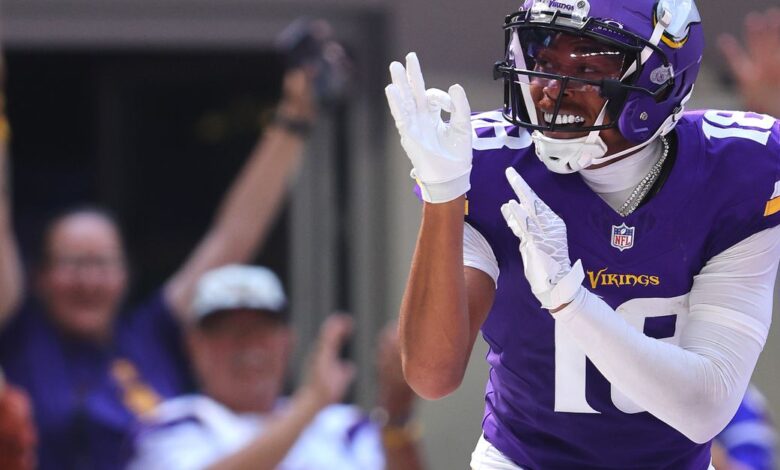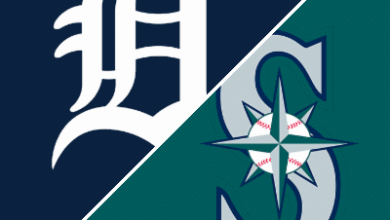The Vikings are for real. Ignore them at your peril

The Minnesota Vikings are 2-0. Yes, those Minnesota Vikings. You know, the team everyone predicted to finish last in the NFC North, the organization whose life was gone after Kirk Cousins left, who were going to have to punt on the season until J.J. McCarthy was ready to be the starter.
In two weeks full of surprises Minnesota might be the most stunning, and yet we also shouldn’t really be mystified by their start. When you get down to brass tacks there’s nothing shocking about why the Vikings are good: They’re well coached on offense, have a solid lines on both sides of the ball, the best wide receiver in the NFL, and a creative defensive coordinator who is able to accentuate the strengths of his talent while masking its deficiencies.
Beating the Giants in Week 1 should be a given for most teams, but to hand the 49ers an L is another thing entirely. At the very least these back-to-back wins have dispelled the preseason narrative surrounding the Vikings that this team would be cooked without Kirk Cousins under center. Truth be told, they’ve more or less been exactly the same. They’re going to perform on offense, be aggressive on defense, and take every opponent they face down to the wire (for better and worse).
The Vikings have the clearest identity of any building team in the NFL. Offensively the team is going to establish the run, and punctuate it with massive passing plays. Hardly revolutionary stuff, but it’s working. On defense the team’s entire goal is preventing explosive plays, understanding they only have one high-caliber cornerback in Stephon Gilmore, so they use a deep stable of linebacker talent to help in coverage and mitigate those explosive play opportunities.
At a time where so many teams are struggling on offense the Vikings seem to have it all figured out. Heck, they’re playing better offensive football than most teams who were contending for a Super Bowl last year. How did all this play out in the win over the Niners?
Trusting Sam Darnold
This feels antithetical to conventional logic. Historically Darnold is a quarterback you need to scheme around, mitigate his potential damage, handle with kid gloves. What Kevin O’Connell is doing is saying that his offensive identity is more important than the player, and that Darnold has the physical tools to work vertically.
That has manifested as supreme confidence in his quarterback. The system is letting Darnold play free, unencumbered, and his passing chart shows the amount of faith being given to him.
:no_upscale()/cdn.vox-cdn.com/uploads/chorus_asset/file/25623493/Screenshot_2024_09_15_at_9.30.00_PM.png)
This might not look like much, but pass charts like this just haven’t been common around the NFL in 2024. Teams are very much on the back foot offensively, and that’s manifested itself as extremely passing playcalling without a great deal of high average depth of target (aDOT) throws. Hell, even the best QB in the league is the victim of more passing playcalling right now with Patrick Mahomes having a worse aDOT on Sunday than Sam Darnold.
The Vikings understand that they don’t have a YAC-speedster. Their receiver talent is far more conventional, and it helps when Justin Jefferson is the best wide receiver in the league. If you want explosive plays you need to let Darnold air it out, and that’s precisely what happened against San Francisco. This also helps because the logic-defying nature of trusting Darnold in this role puts the defense on a back foot and makes them adjust.
Keeping the run varied
The run/pass balance for the Vikings was almost on par Sunday, with 26 pass attempts to 24 rushing attempts. Inside of this though the team had a clear identity. Aaron Jones was used in looping, off-tackle rushing attempts that stretched the field horizontally. This was used primarily on downs where pass catchers showed a threat cutting inside on intermediary route to freeze the 49ers’ linebackers from getting to the edge.
This was punctuated with Ty Chandler, who ran more in the A and B gap off guards, punishing the interior on downs where Jefferson and Co. threatened deeper routes. This led to more vertical respect from the 49ers defense, keeping causing them not to meet Chandler at the gap and instead hanging back in coverage support.
Explaining this feels so simplistic, but executing on all this is where the beauty lies. If you can keep a defense as talented as the 49ers on its toes, then you can do it with anyone.
Justin Jefferson is just that damn good
Perhaps the easiest part of this whole equation is that Justin Jefferson is an incomparable receiver. The speed, instinct for open space, and knack for taking angles out of his route are such that he’s one of the few guys in the league who can make his quarterback better on routes downfield of 20 yards or more.
The threat of Jefferson on every down is a psychological advantage, and that’s a big element of this too.
What is the future of the Vikings?
There’s two ways this can go: Either Darnold and the Vikings are able to keep this rolling, giving us one of the more unbelievable playoff runs in recent memory — or all this bursts into flames as defensive coordinators adjust.
Before you say “that’s just negative thinking,” consider that this EXACT scenario happened in 2021 with the Carolina Panthers when Darnold had four straight weeks of incredible play, then defenses adjusted and he crumbled into dust.
:no_upscale()/cdn.vox-cdn.com/uploads/chorus_asset/file/25623528/Screenshot_2024_09_15_at_10.14.44_PM.png)
That’s no to say it’ll happen here, but the shock-and-awe precedent is there. The difference is that O’Connell is a much better coach that Matt Rhule was, and that could keep this going for longer.
Until there’s signs of a shift: Ignore the Vikings at your peril, because this team is hungry, well coached, and ready to keep upsetting the NFL.
Winner: New Orleans Saints
The entire first second of today’s column could have equally been about the New Orleans Saints, who are playing the best football we’ve seen from them since the Drew Brees era. Proving their success in Week 1 against Carolina wasn’t a fluke, the Saints went into Dallas and absolutely whooped a team being lauded as one of the best in the NFC.
Offensively the Saints are just firing on all cylinders. Derek Carr is absolutely thriving in Klint Kubiak’s offense, which for the first time in Carr’s career seems tailor made for his talents. The intermediary throws that don’t require a lot of movement out of platform is allowing this team to cook — and Kubiak has done an amazing job to help his protection and scheme around injuries on the offensive line.
The Saints are for real, and that’s something that really came out of left field.
Loser: Carolina Panthers
There’s quite literally nothing positive to say about this team. We knew they’d be bad in 2024, but my God the Panthers have failed to meet even our lowest explanations.
Winner: Kyler Murray
When he’s healthy Kyler Murray is the most fascinating man in the NFL. He has these tools that say he could go Super Saiyan whenever he feels like it, but he’s often not motivated enough to try.
Well, a week of criticism really got him angry and the result was a sight to behold. The Cardinals offense was much more open in Week 2 and allowed Murray and Marvin Harrison Jr. to hook up, and they spanked the Rams in a pivotal game to justify this new era. There’s a lot to be excited about if you’re a fan in Arizona.
This is the blueprint, now it’s just time to execute on it.
Loser: Sean Payton
It’s fair to start asking if Sean Payton has just lost it, or whether he ever really had it outside of Drew Brees.
When Payton arrived in Denver he played the blame game for the roster, hanging Denver’s woes on the roster and Russell Wilson. So then he overhauls the team, hand picks his own QB, and the results are largely the same. This team can’t move the ball vertically, Bo Nix doesn’t look convincing under center, and the team is just mediocre.
Payton is running out of excuses and fans deserve better.



